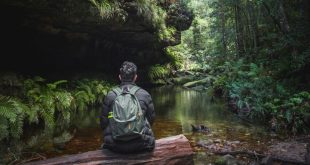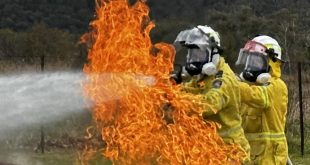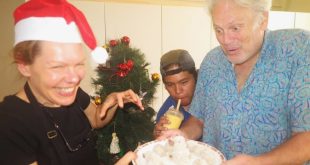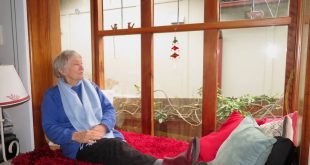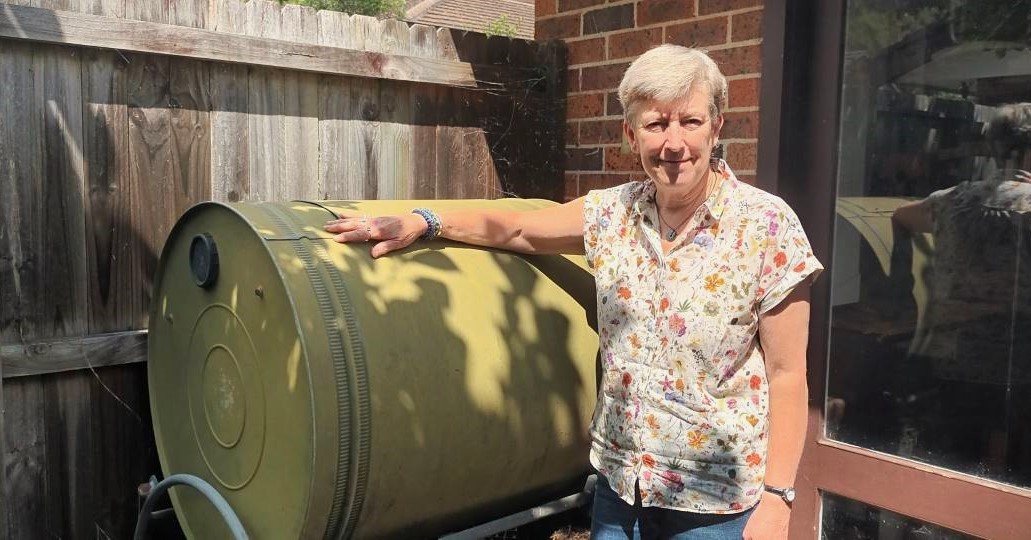
Wentworth Falls resident Belinda Coates has found that eliminating plastic waste isn’t just important, it’s surprisingly easy.
Story and photos by Gabiann Marin
According to website Accumulate.com, the average Australian discards over 130 kilograms of plastic each year, with single use plastic being the major component of this waste. And while Australia has a nationwide recycling program, only 13% of the plastics we throw away are recycled or reused. Plastic waste is not only one of the major contributors to landfill, but is a huge problem for marine and wildlife. Yet there is an effective way to reduce the impact of plastics on our environment – simply stop using so much of it.
Local resident Belinda Coates has done just that, employing easy, cheap and effective solutions to cut her plastic waste to almost zero.
Key Points:
- Thoughtful consumer habits can greatly reduce plastic waste
- Re-connecting with the wisdom of previous generations provides great strategies to save money, reduce plastic consumption and create more sustainable living.
- Reducing plastic packaging not only helps the planet, it gives us access to healthier, more ethically-produced food.
Belinda’s small villa lies nestled in a landscaped garden, surrounded by trees and flowers. The home itself is bright, clean and modern, perfect for Belinda’s contemporary lifestyle. It’s not a large property, with two pocket sized gardens on either side of her single-story home, but Belinda has cleverly utilised the outside area to compost and grow vegetables as part of her commitment to reducing her carbon footprint and eliminating waste in each fortnightly bin collection. (A fortnightly red bin collection is a new initiative offered by Blue Mountains City Council – visit the Council website to apply).
Composting and eating home grown foods are not her only strategies for reducing waste though. Belinda has achieved a close to zero plastic waste lifestyle, eliminating plastics almost entirely from her shopping and her garbage by being thoughtful about how she buys and disposes of these items.
Plastics have become so common that we often don’t realise how much we use, but Belinda believes that if we put some thought into the things we buy and the way we dispose of garbage, anyone can cut their plastic, and general waste, down to almost nothing. “It’s not as hard as it seems,” Belinda says reassuringly.
“I’ve been an advocate for not using plastic for, I think, most of my life,” she says, noting that she may not have a perfect zero target yet, but the key is to reduce and eliminate plastics wherever possible.
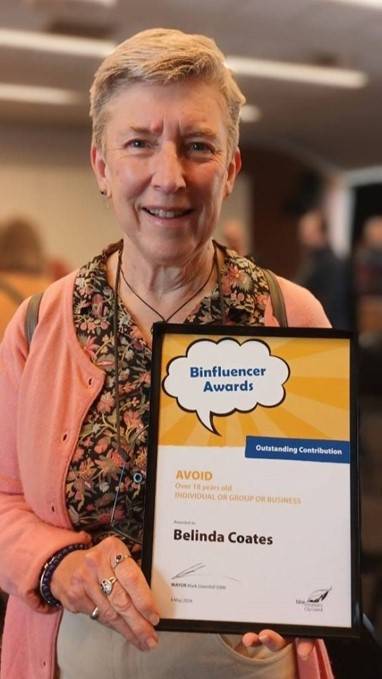
Belinda Coates’ focus on waste elimination saw her awarded a highly commended prize at 2024’s Binfluencer Awards hosted by BMCC.
“If you go back to before the supermarkets, there was the grocery shop, and there was the butcher’s and the chemist and the deli counters and you’d rock up, and you’d get groceries in paper bags, buy only what you needed. But then we got freezers and we could keep food for longer, and then the plastic arrived and we just sort of fell into using it. But if we think about it, we don’t need all this plastic. We can live better without it.”
It’s a philosophy that Belinda developed as a child. “I grew up with a mother who’d been brought up through the Depression, and so we didn’t have a lot of money, and mum brought her Depression ways of doing things. All our waste was wrapped up in newspaper and put in the bin. I remember when gladwrap came in, Mum would wash up the gladwrap and dry it and reuse it. There wasn’t this idea that plastic was just to be thrown away, it was treated like a reusable resource. Now we just throw it in the bin without thinking. All we need to do to cut down our waste is return to some of the strategies and values our parents and grandparents had.”
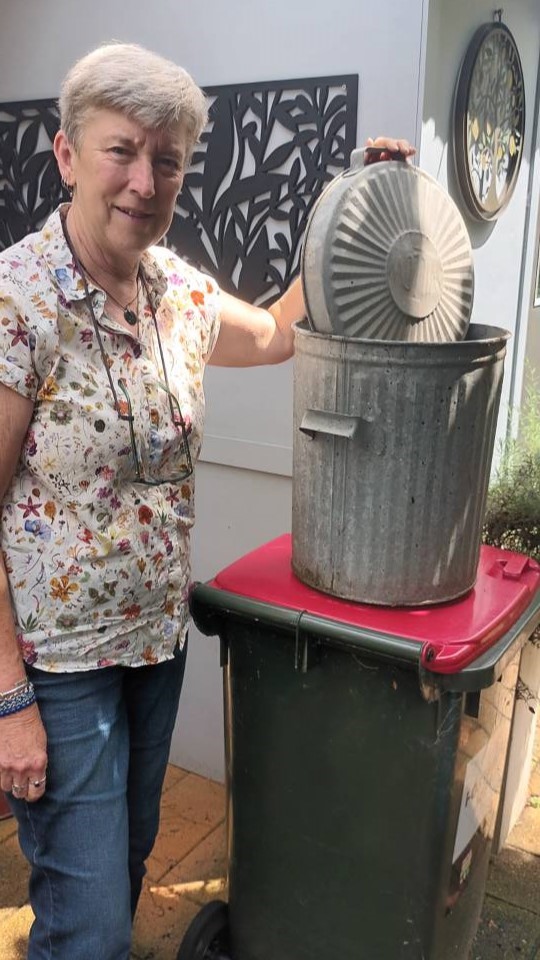
Belinda with her grandfather’s old metal dustbin – which was significantly smaller than the large plastic bins we have today, showing just how much our need for garbage disposal has increased thanks to plastic and non-recyclable waste.
While this may sound daunting to those used to our consuming, convenient modern lifestyle, Belinda is not an advocate for living a life like that of the dismal Depression era, and has some surprisingly easy strategies which anyone can adopt.
The first simple step Belinda took was eliminating bin liners.
“I thought to myself: why do people need bin liners?” Belinda recalls. “There is this belief that garbage will be messy or smelly without them, but that’s really only true for food waste, and using compost and wrapping food in paper works far more effectively than putting it into unnecessary plastic.”
So almost thirty years ago Belinda stopped using garbage liners entirely. She composts all her organic and food waste in an efficient compost system which fits into her small outside area. Meat waste that can’t be composted gets put into the freezer and then wrapped in paper and disposed of straight into the Council bin on pickup day. Used cooking oil is poured into old tins, covered in paper, then frozen and disposed of when the tin is full.
Belinda found almost immediately her garbage reduced in size, and now she has only two small, almost empty interior bins – one for general waste and one for recycling, which she simply lines with newspaper or advertising materials that are delivered to her door.
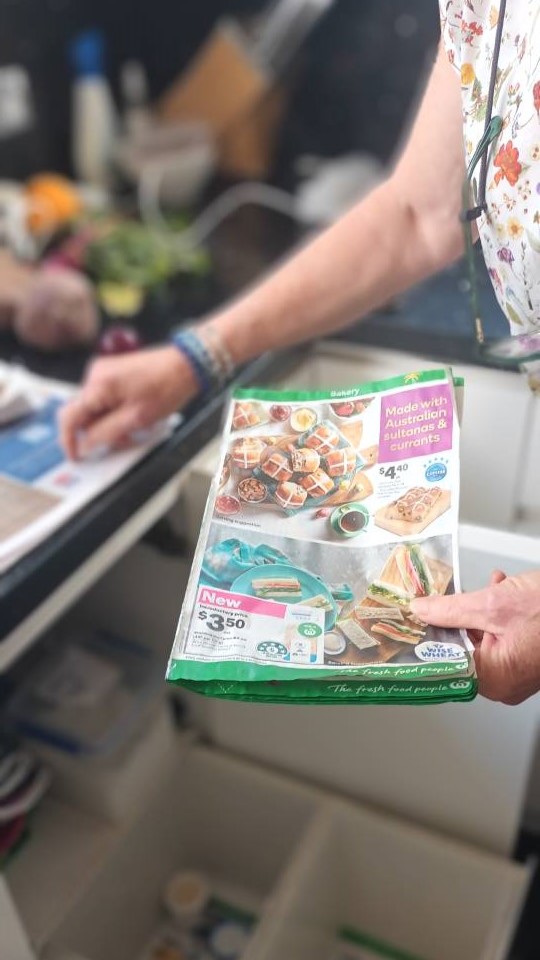
Belinda’s small bin system is lined with paper not plastic.
Once she started to question the need for plastic bin liners, Belinda started to see other unnecessary uses of plastic which could be cut down or eliminated entirely.
“I used to work as a teacher and I would see all these kids with plastic contact on their school books,” she recalls,” and a lot of the teachers would encourage kids to do this. I started to encourage my classes not to do it. Because if the books are covered in contact, how is that book ever going to break down or be recycled.”
Belinda also replaced plastic shopping bags with fabric reusable ones and produce bags for fruit and vegetables: which are perfect substitutes for the plastic roll bags usually on offer at the greengrocers.
“Before I had the produce bags (and if shopping at a regular grocer), I would sometimes use a paper mushroom bag or just leave the items unbagged in my basket and then pop them into a cardboard box or into my bigger shopping bag,” she reveals.
Any plastic bags she can’t avoid get washed and reused, as do the occasional plastic containers for take-away food. Glass jars are washed and reused as storage containers or as packaging for the food she buys at the local food co-op.
Belinda has a secret weapon for removing the sticky residue – which is often left after the labels are removed. Simply soak the jars in water until the label can be peeled off, then spread store bought mayonnaise across the sticky residue and leave for around 30 minutes. Scrape the mayo off with a butter knife and you’ll find the residue underneath has dissolved. A quick rub with some detergent or a scourer will leave the jars clean and ready to be fully washed in the dishwasher.
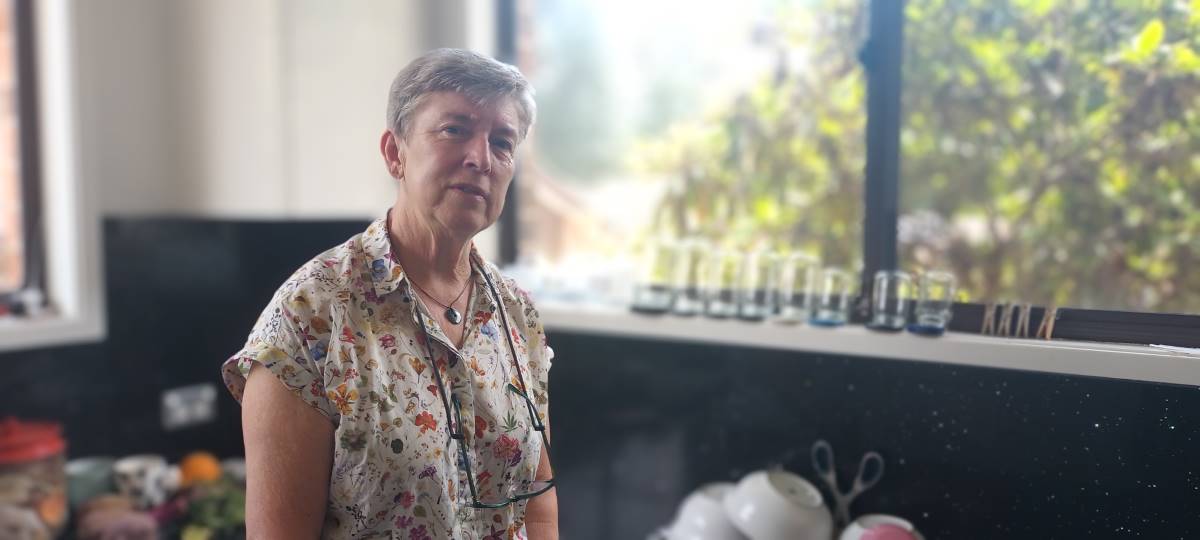
Belinda reuses all her glass jars. Washing and reusing glass jars is a great alternative to plastic packaging and storage containers.
While Belinda is always looking for ways to limit her plastic consumption, she knows it isn’t always possible to be completely plastic free. “There are some things you can’t avoid. If you buy a packet of biscuits, you can’t get away from having plastic on the biscuits. So, I accept that, yeah, there might be a packet of biscuits with some plastic on which is why I am happy we now have soft plastic recycling.”
Blue Mountains Council introduced soft plastic recycling in 2024 and thanks to that initiative, Mountains’ residents can avoid tossing items into landfill that may not be recycled in their fortnightly yellow bins.
“I have a bag in the laundry and when the bag is full, I just do what I call ‘the soft plastic run’. I also take any metal, any batteries, they will also collect X-rays on plastic film, and they were collecting a lot of fabric, but now they’ve had to reduce it to clothing and soft toys because of market changes.”
Shopping from the local food co-op and the Springwood and Blackheath Markets also helped her reduce her plastic consumption. The Blue Mountains Food Co-op, where Belinda also volunteers, has almost no plastic packaging, offers fresh food, including meat and dairy products, and provides paper bags and boxes for all shoppers.
“The Co-op is community-run. I don’t know if it is more expensive than the local supermarket, but the food is better and there is basically no food waste, which is really important. And they pay their suppliers properly,” Belinda explains. “You can become a member but anyone can shop there. If you are a member, then you get 10% off, and then if you volunteer, you earn what are called volley points, and then you get another 10% off the cost of your food. So, I think it’s a win/win situation.”
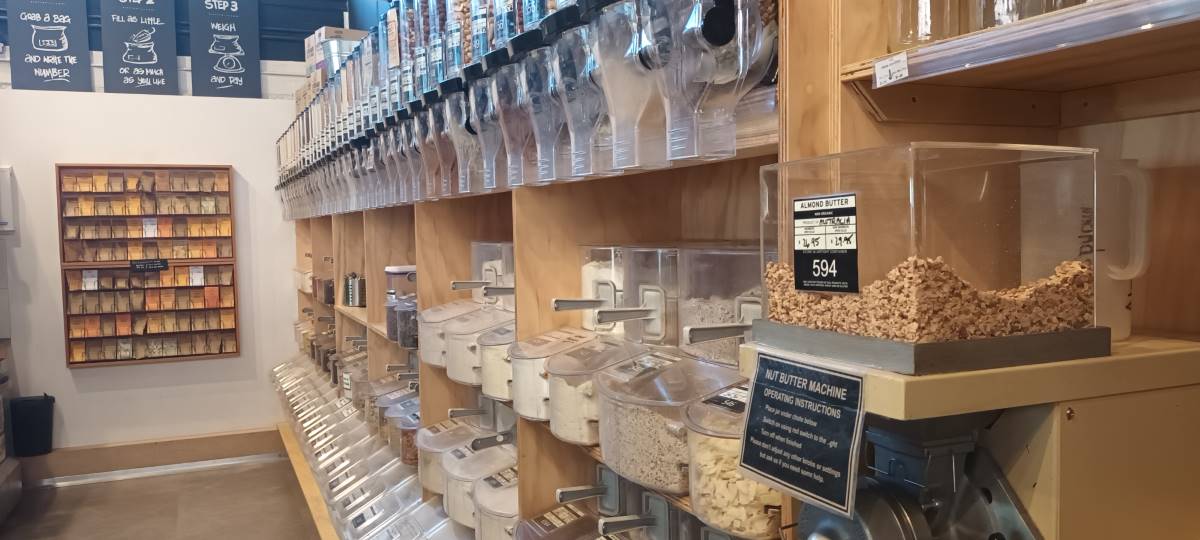
Katoomba Food Co-op offers ethically sourced food which is almost entirely free of plastic packaging.
While Belinda is committed to a reduced waste lifestyle, she understands it can be hard to know where to start finding alternatives to plastic waste.
“We’ve learned that. We’ve been taught that plastic is unavoidable. I guess it’s capitalism and what capitalism has done to the planet,” she says thoughtfully, considering how people generally want to do the right thing but are often deceived by marketing and ‘greenwashing’ strategies which can obscure the harm we are doing.
“It happens over time, you know,” Belinda explains, noting that it can be hard to see the bigger picture of plastic pollution and realise how much we have been conditioned to think of plastic use as being convenient, cheap and insurmountable.
The best solution, Belinda believes, is to stop buying the plastic in the first place.
“Consumers, households and councils are doing this amazing job trying to recycle and deal with all this plastic, but if we keep buying it, they will keep producing it. So, I think that’s where our responsibility might come in to say, no, stop, I’m not buying it.”
And while Belinda acknowledges that moving to a more plastic-free lifestyle may require a bit of flexible thinking, she believes if she can do it, anyone can. Her philosophy is simple: become a thoughtful consumer and consider how your buying and disposal habits affect more than just yourself.
“I just look at all of life – you know, you teach children to be kind to each other, and you hope that adults are kind to each other. And I think that is a philosophy that you can extend to the whole planet. Be kind. Be kind to the animals, be kind to the soil. I know that sounds a bit wacky, but if you look at the Earth as a living organism, and you think, well, would I ingest plastics in my body? No, I wouldn’t. So why would I do that to the soil? Why would I do that to the plants and the animals? So, I just think if people are kind, not just to themselves and not just to people, but kind to everything that’s around them, I think we can have a world we all want to live in.”
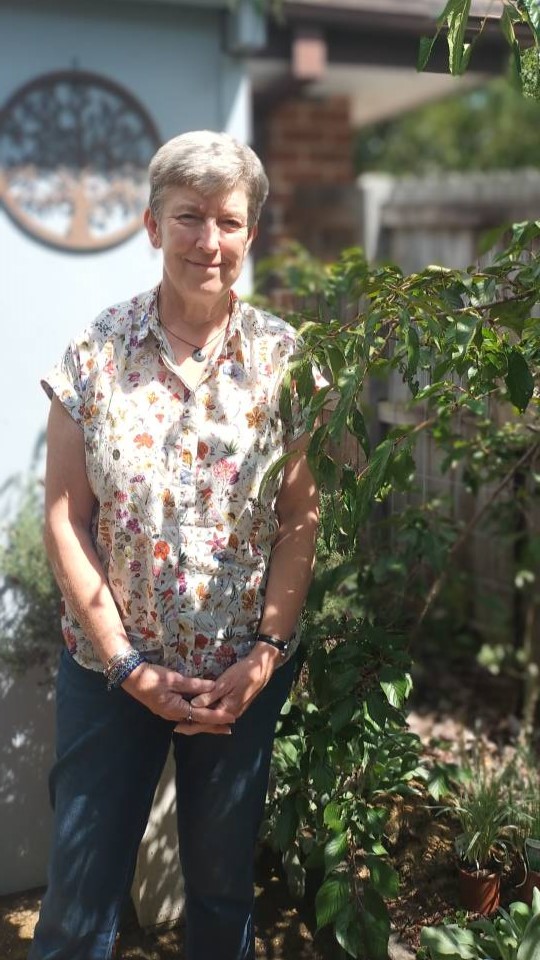
Being kind, to the Earth, wildlife and each other is the philosophy behind Belinda’s waste elimination efforts.
What you can do
Belinda suggests that when starting your plastic elimination journey it’s a good idea to start with achievable goals. Some easy strategies to begin include:
- Eliminate bin liners and use paper to line bins and wrap food waste.
- Reuse meat bones for stock which can be stored in reused glass jars; freeze and then dispose of bones and meat waste in paper.
- Compost food waste where possible. Small compost pots, worm farms and specialty compost bins for apartments and small families can be sourced through councils, hardware stores and local sustainability outlets.
- Try to avoid using plastic containers for food storage. Wash and reuse glass jars and use them to store your small food items like nuts, spices and sweets. Reused jars can also be used as sustainable packaging for food as they can be refilled at the Co-op, meaning you only pay for what you are actually going to eat.
- Taking your own fabric and produce bags to the shops will save a lot of waste. Making fabric shopping bags is also a great way to repurpose old clothes or fabrics which would otherwise be thrown away. Check out our story on Boomerang Bags to find out about an easy bag pattern you can sew yourself.
- Avoid single use plastics like straws, plastic cutlery, shopping bags, food packaging and take away containers. Where possible bring your own storage containers or eating utensils when buying from places which may otherwise give you plastic containers.
- Shopping at the Food Co-op, farmers markets, butchers, greengrocers and delis will get you better quality food and will avoid unnecessary plastic packaging. Bringing your own paper or fabric bags will cut down on plastic waste here as well.
Blue Mountains Co-Ops & Markets
Blue Mountains Food Co-op can be found in the revitalised Katoomba Civic Square across from the Blue Mountains Cultural Centre, at Shop 13 Town Centre Arcade 81 -83 Katoomba Street Katoomba. It is open Monday to Friday 9 am – 6pm. Sat 8.30am – 5pm and Sunday 10 am – 4.30pm. Accessible to anyone, but members get exclusive discounts. Membership is $40 per year per household or $20 for concession holders. For more information go to bmfoodcoop.org.au/about/
Springwood Growers Market held 4th Sunday of the Month 8am – 12pm at 104 Macquarie Road Springwood
Leura Produce & Artisan Market held on the first Sunday of the month 9 am – 1pm at The Fairmont Resort Blue Mountains 1 Sublime Point Rd Leura
The Blackheath Growers Market held on the 2nd Sunday of every month 8 am – 12pm at the Blackheath Community Centre, Cnr Great Western Highway and Gardiner Cres, Blackheath.
Where soft plastic packaging can’t be avoided, reuse plastic bags and any packaging items as much as possible and, instead of tossing them away, recycle them through the Council. Visit this link for more information. This is free for Blue Mountains Council residents and for household quantities only.
Share this article:
This story has been produced as part of a Bioregional Collaboration for Planetary Health and is supported by the Disaster Risk Reduction Fund (DRRF). The DRRF is jointly funded by the Australian and New South Wales governments.
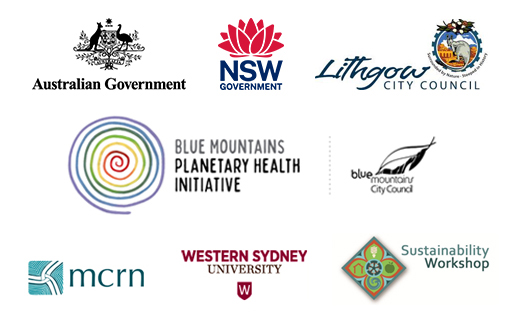
More from around the region
It was gloriously sunny and we had a fabulous day of sharing at the Planetary Health Centre yesterday, from T`ai-chi to workshops on the Frogs of the Blue Mountains, Fashion Upcycling and How to Build a Survival Garden in the Blue Mountains. We finished with a Bushcare session in which we enjoyed the beautiful bushland on the site and removed invasive weeds to expand the habitat for wildlife around our swamp. We were joined by frogs in our pond and the little echidna who returned for a swim! Thank you to everyone who shared so generously. We tasted Yacon and shared rhizomes, Purple Congo Potatoes, Oca, Turmeric, and seeds for Salsify, Egyptian Spinach, Red Mustard, Echinacea, Parsley, Chard, Radish, and Red Noodle Beans. Our next Skillshare Saturday will be on the first Saturday of May. If you`d like to be notified of all our workshops, and the meetings of our Seed Saving and Gardening Groups, subscribe to receive the fortnightly Planetary Health newsletter at any of our Local News sites like www.katoombalocalnews.com (links in profile) #skillshare #planetaryhealth #taichi #qigong #frogs #bluemountains #katoomba #fashionupcycling #upcyclingfashion #survivalgardens #seedsaving #loofah #community
Our Skillshare Saturdays are on the 1st Saturday of every month and we`re looking forward to a beautiful sunny day tomorrow for our first Morning T`ai-chi & Qigong. Fashion Upcycling is booked out this month, but we still have a few places for Frogs of the Blue Mountains, Building a Survival Garden and Planetary Health Bushcare. Bookings via Eventbrite (links in profile). For more information ph. 0407 437 553
#skillshare #planetaryhealth #sunnyday #katoomba #bluemountains #taichi #qigong #frogs #seedsaving #survivalgardens #bushcare
Imagine, if just once a month, everyone gave a few hours back to nature to repair the damage we`ve done. We would so quickly restore the habitat of so many species struggling to survive and provide the habitat for many more to flourish. Once a month, for three hours, our Planetary Health Bushcare group does just that. We`re repairing the damage of human impact and being immediately rewarded by our time in nature and the great company of the other members of our Bushcare Group. We`ll be meeting again this Saturday 5 April at 1.30pm and all are welcome to join us and learn more. Contact Karen Hising at [email protected] or call the Bushcare Office on 4780 5623 if you`d like to give it a try.
For more information about the Planetary Health Centre and how you can get involved contact the Planetary Health office on 0407 437 553
#bushcare #biodiversity #wildlife #habitat #regeneration #planetaryhealth #community #allinthistogether #bushcare #katoomba #bluemountains
In our `How to Build a Survival Garden in the Blue Mountains` workshop on Saturday 5 April, we`ll be starting an Upper Mountains Seed Saving group and sharing seeds, tubers, recipes for more unusual foods, and information about the many ways we can create more food system diversity and resilience. Learn about skirret, salsify, collards, cardoons, sea kale, Good King Henry, mangel wurzel, oca, yacon and more. Places are limited so bookings essential here (link in profile) : bit.ly/4kVAUA8
#foodsystems #foodsecurity #fooddiversity #foodresilience #biodiversity #planetaryhealth #healthydiet #plantbased #katoomba #bluemountains
Was that a frog or cricket you heard? Check out our video matching the photos of the 20 frogs of the Blue Mountains Mountains with their calls so you can learn the difference. View our exhibition, learn how to use the FrogID app, and how to build a frog pond and frog hotel, at our workshop this Saturday 5 April at 9am. Bookings via via link in profile. You can view our full video on YouTube (link in profile). Subscribe for more great content. #frogs #bluemountainsfrogs #planetaryhealth #katoomba #frogcalls #exhibition #workshop
A huge thank you to the Blue Mountains Interfaith Group for organising an inspiring afternoon that brought community together and renewed our sense of connection, hope, wonder, shared purpose and commitment to care for our extraordinary planet. We had a full house with the Frogs of the Blue Mountains looking over our shoulders! Next Saturday 5 April we`ll be launching Saturday morning T`ai-chi and Qigong which will continue on the first Saturday of every month. Bookings essential here (link in profile): bit.ly/3Rn9RzY #interfaith #hope #wonder #commitment #connection #community #planetaryhealth #katoomba #bluemountains #taichi #qigong
Our Planetary Health Newsletter is out! Read it here https://bit.ly/4l7sC89 (link in profile) to find out how Planetary Health has been at the core of Blue Mountains City Council`s Sustainability Model and Map for Action for 25 years and what it means; watch our `We Are Nature` video and our latest video on the Frogs of the Blue Mountains and all their calls; read about how we`re focusing on what connects us, not what separates us, at the Interfaith Gathering this Sunday 30 March; learn how you can take action for Planetary Health on Saturday 5 April with T`ai-chi & Qigong, workshops on the Frogs of the Blue Mountains and building Survival Gardens; and participating in Planetary Health Bushcare. There`s also still time to apply for our Conference and Events Organiser position at the Planetary Health Centre. You can subscribe to receive the newsletter at any of our local news sites, like www.katoombalocalnews.com (link in profile)
@ph_alliance
#planetaryhealth #sustainability #jobs #taichi #qigong #survivalgardens #frogs #bluemountains #katoomba #mapforaction #sustainabilitymodel #wearenature #interfaith #bushcare #community #action


